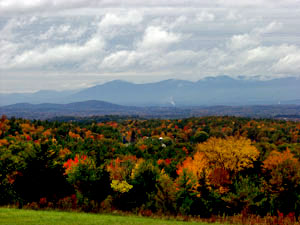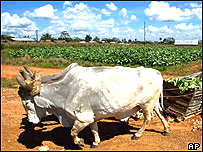The Future of Farming
 Recently, someone asked me what I believe agriculture in Columbia County will look like in fifty years.
Recently, someone asked me what I believe agriculture in Columbia County will look like in fifty years.
This person was considering forming a group to insure the survival of agriculture in our county. I'm glad this question was asked, as we need to develop better opinions of what our challenges will be.
Many people work on initiatives to help agriculture, but some are focusing on narrow, predisposed concerns such as marketing or pricing alone. To understand the challenges the future will bring, we need to imagine it from a broader perspective.
Since I don't have a crystal ball, I honestly can’t tell you what agriculture will look like in fifty years. Whatever happens, it will be the result of the continued demand for land for development and the availability of oil.
As far as the latter is concerned, cheap oil is what allowed for the development of industrial-scale food production, processing and distribution. It is controlled by very few corporations that have used their influence in Washington to keep the prices of commodities at rock bottom by letting taxpayers infuse billions of dollars to allow for overproduction.
Cheap oil allowed farmers to buy low cost fertilizer, pesticides, and insecticides while the farm bill allowed them to produce below cost. The low cost of production of commodities in the United States is astounding, but this has come at a price.
You already know about the pollution of our environment by agriculture, from nitrites and atrazine in drinking water to the depletion of the ozone layer through the production of greenhouse gases.
But there are many other fatalities of industrial agriculture - one of them is the dwindling of farmers with a knowledge base of low-input farming.
Just imagine - and I say imagine, as I don’t know if, where or when any of these possible scenarios will happen: Fuel becomes expensive, raising the cost of food production and distribution dramatically; the EPA puts greater restrictions on ground and surface water protection; and Washington’s agricultural policy is not written anymore by ADM and Cargill but by consumers demanding high-quality food. Farms will look very different with even one of those scenarios playing out - will we be ready for such a new era of agriculture? I am afraid the answer is no.
Farms that are friendly to the environment, use little energy, and produce high quality food are ones that don’t use artificial fertilizer, have a local customer base, and are by definition diversified in nature.  To find an example in real life and see what a transition to such a system can look like, we can learn from what happened to Cuba. In the 1990s, Cuba lost its ability to acquire outside inputs.Agriculture became the first victim of this change, since it depended on imports of fuel, fertilizer, trucks, and farm equipment. Cuba was forced into a transition, but fortunately made the wise choice to invest in this process. One can argue about a lot of things concerning Cuba, and even how well their system without outside inputs really works. But the bottom line is that we can learn how a country makes a transition from high- to low-input systems.
To find an example in real life and see what a transition to such a system can look like, we can learn from what happened to Cuba. In the 1990s, Cuba lost its ability to acquire outside inputs.Agriculture became the first victim of this change, since it depended on imports of fuel, fertilizer, trucks, and farm equipment. Cuba was forced into a transition, but fortunately made the wise choice to invest in this process. One can argue about a lot of things concerning Cuba, and even how well their system without outside inputs really works. But the bottom line is that we can learn how a country makes a transition from high- to low-input systems.
When Fred Kirschenmann, a biodynamic farmer in North Dakota, was asked about this, he responded: “Paul Roberts in his book 'The End Of Oil' puts it very succinctly. He says: 'The issue isn’t whether or not change will come. The issue is whether it or not it will come in a fairly orderly and deliberate way or whether it will come in a chaotic and violent way because we did not begin planning for it soon enough.' A resource that Cuba had, which we probably won’t have much longer - they had older farmers, who before they got hooked on the energy-intensive system, still knew some of the farming techniques from the past.I met some of the older guys.What they did was marry the wisdom of these farmers of the past with the scientists who were given the challenge of coming up with the science-based information for how they could develop systems for the future together. It was pretty remarkable”. (BIODYNAMICS, Summer 2006)
The one comment that grabbed my attention was the one about the older farmers. You know, in this country those farmers have to be over 80 years old to remember low-input, diversified farming systems.
Today’s farmers are very good at doing one thing,whether it is milking cows or raising corn and soybeans; and all are based on high inputs such as fertilizer, pesticides or feed.A hog farmer today does not know how to plant grains; neither does a grain farmer know how to raise animals. A potato farmer is faced with the dilemma of incorporating a great diversity of crops and animals on the farm in order to raise healthy spuds without chemicals.
Understanding that everything on the farm is interdependent is a lost wisdom and not easily taught to new or established farmers. Young aspiring farmers, fresh from college, are very receptive to the ideas, but many still have to learn how to pitch a fork. It is unlikely to base a rapidly changing future on either first-generation or single-commodity farmers.
So who will supply us with food in the future when we do run out of oil? Our only hope is education, and the foresight to begin the transition today by investing money in developing new systems that can be taught. Unfortunately, 99% of our research still ends up focusing on developing more sophisticated technologies that perpetuate the existing system. Our only hope is that the people who work with the other 1% of funding develop the kind of innovation that our future demands.
* * * * * * * * * * * * * * * * * * * * * * * * *
Since 1990, Jean-Paul Courtens' Roxbury Farm has been one of the pioneers of organic agriculture and Community Supported Agriculture in Columbia County, New York. In 1991, Roxbury became the first CSA farm to have a community in New York City. Roxbury continues to be a nationally recognized leader in organic, biodynamic, and CSA.
Jody Bolluyt became a partner in 2001. She supervises the day to day farm work and is responsible for the harvest management, distribution, and does much of the administrative work of the CSA membership. Since 1992, Jean-Paul Courtens has led workshops for farmers in other parts of the country and in 1994, he helped to found CRAFT, an organization that trains organic farm apprentices.
In 2000, Roxbury became a leader in the farmland protection movement, as a central component in a land acquisition and conservation effort that will not only secure the long term future of Roxbury's farmland, but will be a model for other farms in the Hudson Valley and all over the country.In 2004, Jean-Paul received the Patrick Madden Award for Sustainable Agriculture from SARE (Sustainable Agriculture Research and Education).
[Picture of Roxbury Farm in Autumn by Jane Sherry]
